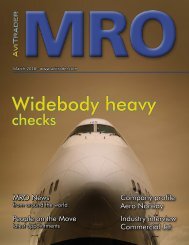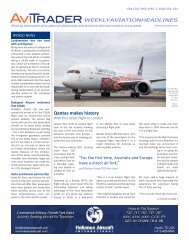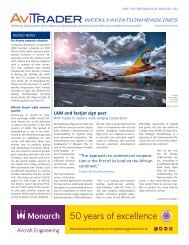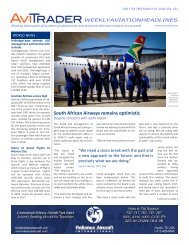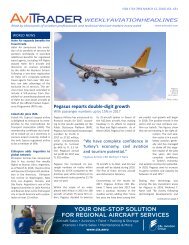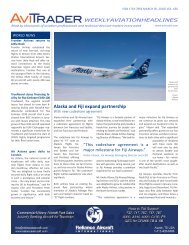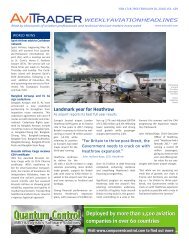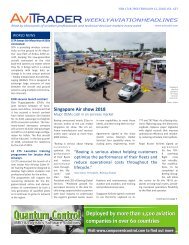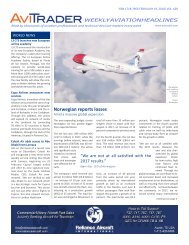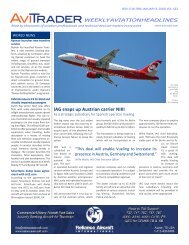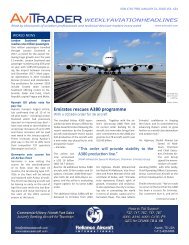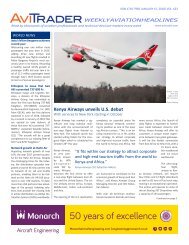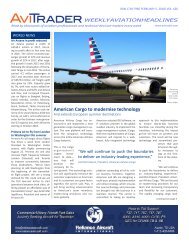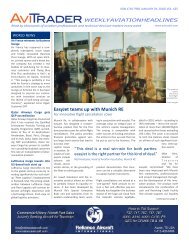AviTrader_Monthly_MRO_e-Magazine_2016-06
AviTrader_Monthly_MRO_e-Magazine_2016-06
AviTrader_Monthly_MRO_e-Magazine_2016-06
Create successful ePaper yourself
Turn your PDF publications into a flip-book with our unique Google optimized e-Paper software.
IBA Opinion<br />
24<br />
Ultimately, it is the older aircraft which are not leased that carry the<br />
largest risk of high cost AD exposure.<br />
A separate but related topic is that of performance guarantees such<br />
as fuel burn and payload/range, which are very keenly negotiated<br />
when new aircraft types are introduced. On one hand launch airline<br />
customers will get the best pricing from the OEM partly because there<br />
is always an entry into service risk but this will be balanced with certain<br />
guarantees, subsidies and in some cases, walk away options. The<br />
recent press surrounding the A320neo is a good example of performance<br />
guarantees being exercised.<br />
The three key areas we have subsequently identified across numerous<br />
projects are:<br />
• Warranty claims: clawing back cash or credit from the OEM<br />
• The management of ADs: sharing the cost where applicable<br />
• Maintenance reserves.<br />
In all cases, when identified quickly, all three cost claims can be swiftly<br />
negotiated.<br />
Taking the case of a mature aircraft type, for example a B737NG or<br />
A320ceo, entering service, it is expected that there are ten claims at a<br />
value of US$25,000 in the first two years. In the longer term there will<br />
be ADs issued and other improvements which can result in additional<br />
claims. Typically, these are engine related or structural matters that<br />
may need to be addressed at shop visits or longer downtime airframe<br />
checks. If, as a guide, we say that 1% of the purchase price equals the<br />
average warranty cost (for smaller aircraft it can be more, for larger<br />
aircraft less), it is easy to understand how millions can lay unclaimed,<br />
either in credits or hard cash.<br />
When conducting audits of operators, the following three areas are<br />
where issues typically arise:<br />
process and agreements, and to explore ways in which each department<br />
can better understand the requirements in order to create a robust<br />
claim.<br />
Secondly, IBA can create and implement procedures. Since each airline<br />
set up is different, from the large legacy carrier with in house<br />
resource to the new low cost airline that outsources warranty management<br />
to its <strong>MRO</strong>, these are bespoke. Typically we spend two weeks<br />
onsite with the engineering, operations and finance teams collating a<br />
directory of possible warranty claims and actions. In many cases, we<br />
are able to benchmark the volume and value of claims made to help<br />
a client understand where they rank and we can also highlight where<br />
other operators may have had more success.<br />
The warranties available to airlines are plentiful but potentially complex<br />
given the large number of vendors associated with the aircraft<br />
and its systems.<br />
We have seen wide variations in how airlines handle the warranty process.<br />
For some, there are detailed procedures for the line maintenance<br />
teams and technical records teams to review the log pages diligently<br />
and raise claims within the defined period. Most however, do not have<br />
processes and leave millions of dollars unclaimed.<br />
For operators on top of claims, we have seen both in house and outsourced<br />
solutions work well. In house solutions can have clear benefits<br />
once the procedures are established and explained to all. However,<br />
both staff turnover and expansion can lead to warranty claim monitoring<br />
lapses. At IBA, we have found that an outsourced solution recovers<br />
more funds, the likely reasons as below:<br />
• An outsourced solution will have a broader view of the approaches<br />
of other operators and aircraft types<br />
• In IBA’s experience, it is difficult for employees to remain focused on<br />
claims across departments. As the role of monitoring claims naturally<br />
ebbs and flows, the team is often subsumed into other projects during<br />
quiet periods and then struggles to refocus<br />
• IBA’s remuneration being related to the successful claims.<br />
• Claiming: when an aircraft goes tech, the primary goal of the team<br />
(either the airline in-house or contracted <strong>MRO</strong>) is to fix the issue safely<br />
and quickly. Where warranty work is fitted into scheduled or unscheduled<br />
maintenance, it is rarely engineering’s primary focus to account<br />
for the cost of components, the time taken to fix the aircraft and any<br />
business interruption<br />
• Processing: most warranty claims have fixed periods in which claims<br />
can be made. Managing successful claims and rejections is, again,<br />
a task that sits across various departments at an airline and can be<br />
overlooked as a result<br />
• Lease documentation: problems can arise irrespective of the carrier<br />
size. A small operator might be constrained by a lease with very<br />
rigid or unclear terms, making warranty claims time-consuming and<br />
expensive. For large operators, staying on top of the volume of data<br />
across aircraft types, a mix of lessors and, frequently, a mix of digital<br />
and paper records is a key challenge.<br />
IBA was established in 1988 to provide independent expert business analysis<br />
and advice to the aviation industry.<br />
IBA advises commercial and business aviation clients, aircraft or engine<br />
manufacturers and operators. Services include asset valuations, technical<br />
and engine management, consulting and commercial services, industry<br />
and sector research and analysis. Paul.Lyons@ibagroup.com<br />
IBA’s approach with airlines is twofold:<br />
Firstly, training and education. We bring together the airline engineering,<br />
maintenance, operations and finance teams to discuss the specific<br />
www.ibagroup.com<br />
<strong>AviTrader</strong> <strong>MRO</strong> - June <strong>2016</strong>



